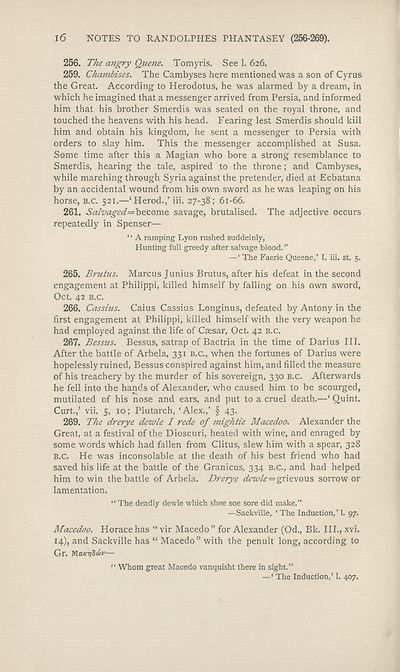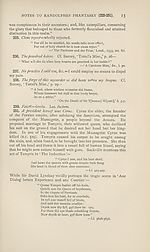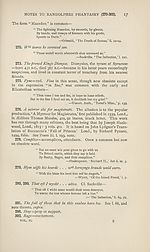Scottish Text Society publications > Old series > Satirical poems of the time of the reformation > Volume 2, 1893
(32)
Download files
Complete book:
Individual page:
Thumbnail gallery: Grid view | List view

16 NOTES TO RANDOLPHES PHANTASEY (256-269).
256. The angry Quene. Tomyris. See 1. 626.
259. Chambises. The Cambyses here mentioned was a son of Cyrus
the Great. According to Herodotus, he was alarmed by a dream, in
which he imagined that a messenger arrived from Persia, and informed
him that his brother Smerdis was seated on the royal throne, and
touched the heavens with his head. Fearing lest Smerdis should kill
him and obtain his kingdom, he sent a messenger to Persia with
orders to slay him. This the messenger accomplished at Susa.
Some time after this a Magian who bore a strong resemblance to
Smerdis, hearing the tale, aspired to the throne; and Cambyses,
while marching through Syria against the pretender, died at Ecbatana
by an accidental wound from his own sword as he was leaping on his
horse, b.c. 521.—‘Herod.,’ iii. 27-38; 61-66.
261. Salvaged=\)&zomz savage, brutalised. The adjective occurs
repeatedly in Spenser—
“ A ramping Lyon rushed suddeinly,
Hunting full greedy after salvage blood.”
—‘ The Faerie Queene,’ I. iii. st. 5.
265. Brnhts. Marcus Junius Brutus, after his defeat in the second
engagement at Philippi, killed himself by falling on his own sword,
Oct. 42 B.C.
266. Cassucs. Caius Cassius Longinus, defeated by Antony in the
first engagement at Philippi, killed himself with the very weapon he
had employed against the life of Caesar, Oct. 42 b.c.
267. Bessus. Bessus, satrap of Bactria in the time of Darius III.
After the battle of Arbela, 331 b.c., when the fortunes of Darius were
hopelessly ruined, Bessus conspired against him, and filled the measure
of his treachery by the murder of his sovereign, 330 B.c. Afterwards
he fell into the hands of Alexander, who caused him to be scourged,
mutilated of his nose and ears, and put to a cruel death.—‘ Quint.
Curt.,’ vii. 5, 10; Plutarch, ‘Alex.,’ § 43.
269. The drerye dewle I rede of mightie Macedoo. Alexander the
Great, at a festival of the Dioscuri, heated with wine, and enraged by
some words which had fallen from Clitus, slew him with a spear, 328
B.c. He was inconsolable at the death of his best friend who had
saved his life at the battle of the Granicus, 334 b.c., and had helped
him to win the battle of Arbela. Drerye grievous sorrow or
lamentation.
“ The deadly dewle which shee soe sore did make.”
—Sackville, ‘ The Induction, ’ 1. 97.
Macedoo. Horace has “ vir Macedo ” for Alexander (Od., Bk. III., xvi.
14), and Sackville has “ Macedo” with the penult long, according to
Gr. Ma/njScvv—
“ Whom great Macedo vanquisht there in sight.”
—1 The Induction,’ 1. 407.
256. The angry Quene. Tomyris. See 1. 626.
259. Chambises. The Cambyses here mentioned was a son of Cyrus
the Great. According to Herodotus, he was alarmed by a dream, in
which he imagined that a messenger arrived from Persia, and informed
him that his brother Smerdis was seated on the royal throne, and
touched the heavens with his head. Fearing lest Smerdis should kill
him and obtain his kingdom, he sent a messenger to Persia with
orders to slay him. This the messenger accomplished at Susa.
Some time after this a Magian who bore a strong resemblance to
Smerdis, hearing the tale, aspired to the throne; and Cambyses,
while marching through Syria against the pretender, died at Ecbatana
by an accidental wound from his own sword as he was leaping on his
horse, b.c. 521.—‘Herod.,’ iii. 27-38; 61-66.
261. Salvaged=\)&zomz savage, brutalised. The adjective occurs
repeatedly in Spenser—
“ A ramping Lyon rushed suddeinly,
Hunting full greedy after salvage blood.”
—‘ The Faerie Queene,’ I. iii. st. 5.
265. Brnhts. Marcus Junius Brutus, after his defeat in the second
engagement at Philippi, killed himself by falling on his own sword,
Oct. 42 B.C.
266. Cassucs. Caius Cassius Longinus, defeated by Antony in the
first engagement at Philippi, killed himself with the very weapon he
had employed against the life of Caesar, Oct. 42 b.c.
267. Bessus. Bessus, satrap of Bactria in the time of Darius III.
After the battle of Arbela, 331 b.c., when the fortunes of Darius were
hopelessly ruined, Bessus conspired against him, and filled the measure
of his treachery by the murder of his sovereign, 330 B.c. Afterwards
he fell into the hands of Alexander, who caused him to be scourged,
mutilated of his nose and ears, and put to a cruel death.—‘ Quint.
Curt.,’ vii. 5, 10; Plutarch, ‘Alex.,’ § 43.
269. The drerye dewle I rede of mightie Macedoo. Alexander the
Great, at a festival of the Dioscuri, heated with wine, and enraged by
some words which had fallen from Clitus, slew him with a spear, 328
B.c. He was inconsolable at the death of his best friend who had
saved his life at the battle of the Granicus, 334 b.c., and had helped
him to win the battle of Arbela. Drerye grievous sorrow or
lamentation.
“ The deadly dewle which shee soe sore did make.”
—Sackville, ‘ The Induction, ’ 1. 97.
Macedoo. Horace has “ vir Macedo ” for Alexander (Od., Bk. III., xvi.
14), and Sackville has “ Macedo” with the penult long, according to
Gr. Ma/njScvv—
“ Whom great Macedo vanquisht there in sight.”
—1 The Induction,’ 1. 407.
Set display mode to: Large image | Zoom image | Transcription
Images and transcriptions on this page, including medium image downloads, may be used under the Creative Commons Attribution 4.0 International Licence unless otherwise stated. ![]()
| Publications by Scottish clubs > Scottish Text Society publications > Old series > Satirical poems of the time of the reformation > Volume 2, 1893 > (32) |
|---|
| Permanent URL | https://digital.nls.uk/107427143 |
|---|
| Attribution and copyright: |
|
|---|
| Description | A collection of over 100 Scottish texts dating from around 1400 to 1700. Most titles are in Scots, and include editions of poetry, drama, and prose by major Scottish writers such as John Barbour, William Dunbar, Gavin Douglas, and George Buchanan. Edited by a key scholarly publisher of Scotland's literary history, and published from the late 19th century onwards by the Scottish Text Society. Available here are STS series 1-3. |
|---|

